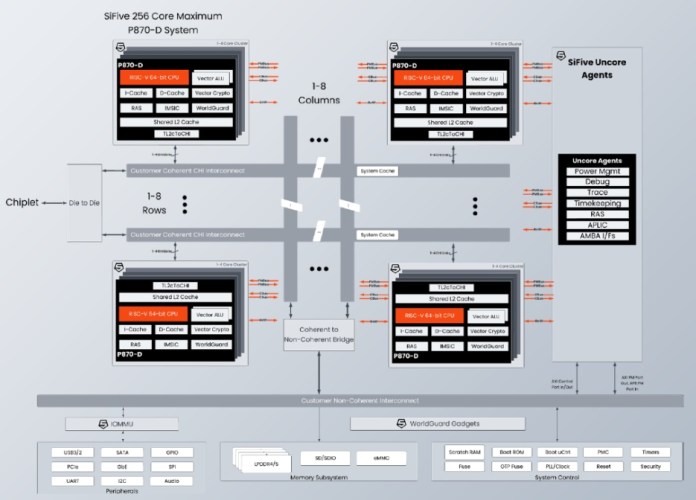SiFive, Inc. has unveiled its SiFive Performance P870-D data-center processor, targeting highly parallelizable infrastructure workloads such as video streaming, storage and web appliances. The processor enables data-center architects to build extremely high-performance, energy-efficient compute subsystems for AI-powered applications.
The P870-D, building on the P870, supports the open AMBA CHI protocol for flexibility to scale the number of clusters up to 256 cores, which boosts performance and minimizes power consumption. Industry-standard protocols include Compute Express Link (CXL) and CHI chip to chip (C2C), which enables coherent high-core-count heterogeneous SoCs and chiplet configurations, SiFive said.
The P870-D processor enables infrastructure SoCs with higher compute density and improved performance per watt for workloads, executing multiple compute tasks in parallel. The solution targets data-center, vehicle and embedded system applications.
The P870-D features include compute-on-demand, toolchains and application software frameworks, and with the RVA23 profile, system developers can leverage a range of operating systems. The processor supports the RISC-V Sv57 extension for enabling 57-bit virtual address space support, four CHI ports/clusters and a wider link for multiple peripheral and memory device ports. It also integrates an Advanced Interrupt Architecture (AIA) compliant controller with support for Message Signaled Interrupts (MSI) and virtualization.

The P870-D enables scalable subsystems with core clusters, distributed IOMMU, cross-cluster RAS and WorldGuard Security. (Source: SiFive, Inc.)
SiFive also added Reliability Availability Serviceability (RAS) features to the P870-D. RAS features are designed for early detection of errors and to protect data integrity, helping to prevent downtime and ensuring the overall reliability of the system, SiFive said. The P870-D also includes a distributed and scalable IOMMU for accelerating virtualized device IO, which is critical for the latest functional safety and security requirements, according to the company.
Many open-source software elements already exist for RISC-V. The P870-D processor is aligned with the platform and profile standards defined by RISC-V International.
SiFive and its ecosystem partners are working to further streamline the development of complete systems. Arteris, for example, collaborated with SiFive to deliver an emulation-ready reference design with the X280 and P870-D processors. By integrating SiFive’s RISC-V based processors with Arteris’ network-on-chip (NoC) IP, customers can accelerate product development.
The P870-D processor is sampling to lead customers. A final production release is scheduled by the end of 2024.
Advertisement
Learn more about SiFive





